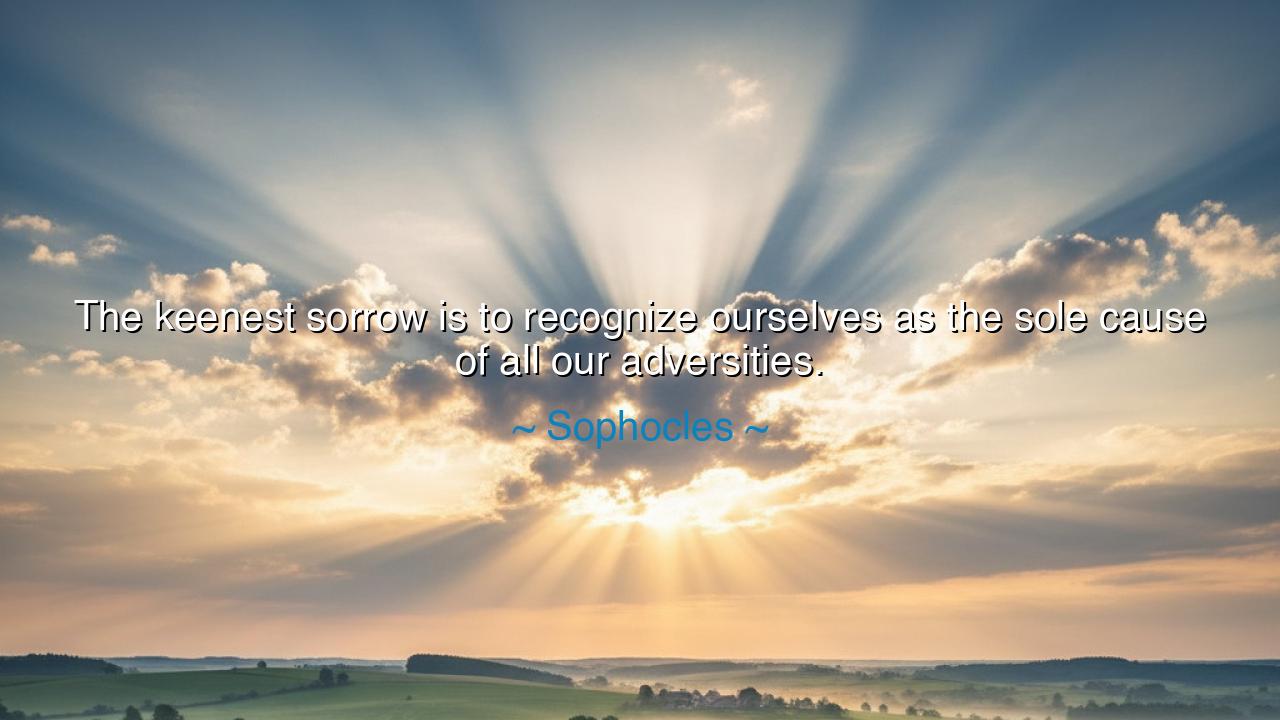
The keenest sorrow is to recognize ourselves as the sole cause of






The ancient tragedian Sophocles, whose words have echoed through the centuries like the voice of fate itself, once declared: “The keenest sorrow is to recognize ourselves as the sole cause of all our adversities.” These words, spoken with the gravity of a man who understood both gods and men, pierce directly to the heart of human suffering. For what pain could be greater than realizing that the hand which struck us was our own? This is not merely a statement of guilt—it is a revelation of self-awareness, the tragic awakening that comes when the veil of illusion is torn and we see, at last, the architect of our downfall staring back from the mirror.
The origin of this quote is rooted in the spirit of Greek tragedy itself, where the greatest conflicts were not between men and the gods, but between man and his own nature. Sophocles, author of Oedipus Rex and Antigone, was a poet of destiny—yet his true genius lay in showing that fate often unfolds from within, not from without. His heroes were not merely victims of divine will; they were undone by their choices, their blindness, their hubris. In this, Sophocles teaches that the human soul carries within it both the seed of greatness and the root of ruin. And when that ruin blossoms, the sorrow it brings is “keenest” precisely because it cannot be blamed on gods, enemies, or circumstance—it belongs entirely to us.
Consider the tale of Oedipus, the king who sought truth with noble intent but was destroyed by the truth he found. He fled from a prophecy to escape his fate, yet in fleeing, he ran straight into it. When the moment of realization came—that he had slain his father and married his mother—the weight of his own actions crushed him more than any punishment of heaven could. In that instant, his cry was not against the gods, but against himself. This, Sophocles tells us, is the deepest sorrow: not the loss of fortune or love, but the shattering of innocence—the knowledge that our suffering was born of our own will, our own blindness, our own pride.
And yet, in this darkness lies a paradoxical form of wisdom. For to recognize ourselves as the cause of our adversities is also to reclaim the power to change. While the pain of self-blame is sharp, it is also purifying—it strips away illusions and teaches the soul to walk humbly and wisely. In the ancient temples of Delphi, the words “Know thyself” were carved above the entrance, a command not of comfort, but of challenge. To know oneself fully is to confront both light and shadow—to see how our fears, desires, and arrogance shape the course of our lives. Only through such knowledge can we transform our sorrow into strength.
History, too, bears witness to this truth. The mighty Napoleon Bonaparte, once the conqueror of Europe, ended his days in exile, haunted not merely by defeat but by the realization that his own ambition had led him there. “I have destroyed myself,” he is said to have murmured on his lonely island. It was not the armies of others, but the unchecked fire of his own will that consumed him. So it is with all men and women who seek to blame the world for their misfortune—the wise learn that fate is often the echo of their own deeds.
Yet, Sophocles’ wisdom is not a call to despair, but to responsibility. For when we accept that we are the cause of our adversities, we also discover that we are the creators of our deliverance. The same hand that built the prison can tear down its walls. The same pride that led to ruin can, when tempered by humility, become the foundation of wisdom. There is no redemption in denial; but in the fire of truth, the soul is refined.
The lesson, then, is this: face your sorrow with courage. When pain comes, do not turn first to blame the world or the heavens. Look within. Ask what choices, what blindness, what fears led you here. In this act of honest reflection lies the beginning of freedom. For though it is a bitter truth that we are the source of our own suffering, it is also a glorious truth that we are the source of our own salvation.
So remember the teaching of Sophocles: “The keenest sorrow is to recognize ourselves as the sole cause of all our adversities.” Let this not be a curse upon your spirit, but a light that reveals your power. For every tear shed in the recognition of fault waters the seed of wisdom. The one who learns from his own downfall rises stronger than before. And though the gods may watch from afar, it is the man who conquers himself who truly ascends.






AAdministratorAdministrator
Welcome, honored guests. Please leave a comment, we will respond soon